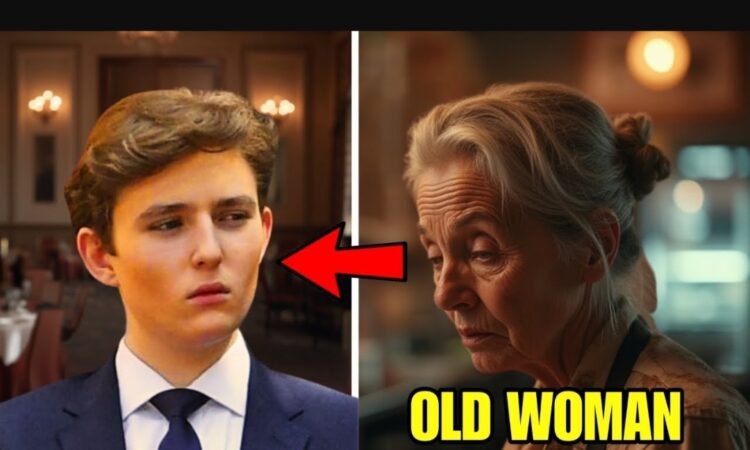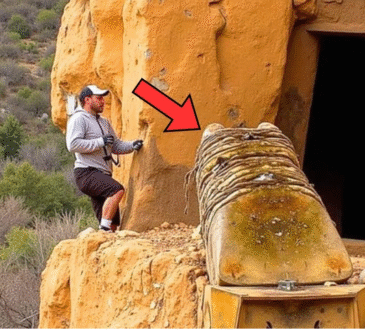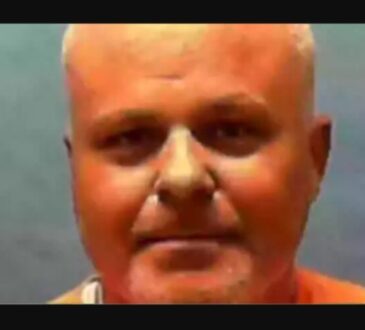
Martha’s hands trembled as she tied the stained apron around her waist. Another grueling shift at Fred’s Diner awaited. At 68, every step was a reminder of a lifetime of wear her back ached, her feet dragged, and the weight of decades pressed heavily on her shoulders. She could have retired years ago, but life hadn’t been kind. Bills stacked up like storm clouds. Losing her tiny apartment wasn’t an option, so she worked day and night.
The lunchtime rush roared to life plates clattered, orders were barked, and impatient customers tapped their fingers on worn-down tables. Martha weaved through the chaos with her head low and focus sharp. She couldn’t afford a mistake. Not today.
But life has a cruel way of testing the already broken.
As she reached for a steaming cup of coffee meant for a corner table, her worn-out shoes slipped on a slick patch of the floor. The cup flew from her hands and splashed its contents across the pristine white shirt of a tall young man.
The diner fell silent.
Whispers spread like wildfire.
“Do you know who that is?” someone hissed.
Martha’s heart dropped. She didn’t need to know. The way people reacted said it all.
Baron Trump.
Her knees buckled. She stumbled backward, panic flooding her veins. She knew enough to recognize power when it stood before her. Baron Trump wasn’t just anyone—he was a symbol of privilege, his presence wrapped in an aura of influence and untouchability. His security detail sprang into action, surrounding him as if Martha had committed an unforgivable offense.
“She’s done for,” someone muttered.
Martha’s voice quivered. “I—I’m so sorry, sir. I didn’t mean to—”
Before she could finish, Baron raised a hand—not to scold, but to calm his guards.
“It’s fine,” he said, his voice steady and kind.
Martha blinked. Had she heard him right?
The diner held its breath. The silence grew heavier. Some leaned in, others exchanged glances.
Why wasn’t he angry?
Was this a setup?
Martha’s face burned with shame. “I’ll pay for the dry cleaning. Please, I’m so sorry.”
Baron offered a small smile. “Don’t worry about it. Accidents happen.”
Everyone stared, dumbfounded. It was as if he hadn’t just been doused in steaming coffee. Martha didn’t know what to make of it—but something deeper shimmered behind his calm demeanor. The guards remained tense. One leaned in to whisper, but Baron shook his head.
“She didn’t mean any harm,” he said firmly.
Martha, still trembling, tried to return to work. Years of hardship had trained her to expect the worst. But this—this kindness—left her reeling.
“What’s your name?” Baron asked gently.
She hesitated. “Martha.”
“Well, Martha,” he said, “do you have a moment to sit and talk?”
The question stunned her—and everyone listening.
A billionaire. Asking to sit with a waitress?
“I—I still have tables to serve,” she stammered.
Baron turned to the manager. “I’ll cover her tables. Just for a few minutes.”
Caught off guard, the manager nodded. “Of course, Mr. Trump.”
Reluctantly, Martha sat across from him. Her hands fidgeted with her apron.
“Why are you being so nice to me?” she blurted.
Baron leaned in. “Sometimes the world is cruel. I’ve seen it. But I believe in kindness when it matters most.”
Her eyes welled with tears.
“What brought you to this job?” he asked.
She paused. “Life happened. Lost my husband years ago. Bills don’t stop coming.”
“That’s tough,” he said softly. “But you’re still standing. That’s something to be proud of.”
The words hit her harder than she expected. She’d felt invisible for so long.
“Why do you care about someone like me?” she whispered.
“Because every person matters,” Baron said. “You’ve worked harder than most people ever will. That deserves respect.”
For the first time in years, Martha felt seen.
As the diner resumed its rhythm, Baron stood and left her with a simple question: “What did you dream of before life got in the way?”
She hesitated. “I wanted to open a café. Something small. Something mine.”
Baron nodded thoughtfully. “Then maybe it’s time.”
He left shortly after. On the table, he left a folded napkin.
Sometimes dreams are just waiting for the right moment to come true.
The next morning, Martha awoke to a knock at the door. A man in a suit stood outside.
“Martha Hayes?” he asked.
“Yes?”
He handed her a large envelope. “From Mr. Trump.”
Inside was a handwritten letter and a check. The letter read:
Dear Martha,
Your story touched me deeply. No one should have to abandon their dreams because of life’s hardships. Inside this envelope is a small token to help you start again. Consider it a thank you—for showing me what resilience looks like.
With kindness,
Baron Trump
The check was enough to pay off her debts—and start the café she’d only ever dreamed about.
Overwhelmed, she clutched the letter to her chest.
But this was just the beginning.
Martha began planning. She worked shifts at the diner by day, researched business plans by night. Some coworkers whispered cruel things—suggesting she didn’t earn it, that it was a stunt. But she pressed on. Then, one evening, a message lit up her phone:
Don’t let anyone discourage you. You’ve got this. —Baron
That message reignited her spark.
Weeks passed. With help from Baron’s team, she found a cozy sunlit corner property. The landlord had doubts.
“This is a big risk,” he warned. “You sure you’re up for it?”
Martha straightened her spine. “I’ve spent my life serving others. Now I want to serve in a way that matters to me.”
He studied her, then smiled. “You’ve got grit. Let’s do it.”
Renovations began. When a burst pipe delayed the opening and drained her budget, Martha nearly gave up. But another message came.
Setbacks are part of the process. Remember why you started.
Repairs finished. The café finally opened—Martha’s Place.
On opening day, the first customer through the door was Baron Trump.
“I told you you could do it,” he said.
Tears filled Martha’s eyes as she served him the first cup of coffee.
Word spread. Videos and photos of the grand opening went viral. The café became a symbol of hope. Not everyone celebrated. Critics whispered she didn’t deserve it.
But Baron reminded her, “You made this happen. Don’t let anyone take that away.”
To give back, Martha launched a Pay It Forward day—customers could leave prepaid meals for those in need. The response was overwhelming. The café became more than a business—it became a sanctuary.
When another disaster struck—a flooded café—volunteers showed up to help. Customers. Neighbors. Even Baron.
“This café isn’t just yours anymore, Martha,” he said. “It belongs to everyone you’ve touched.”
One year later, Martha’s Place held a celebration. The café buzzed with warmth, joy, and purpose.
Martha stood behind the counter, hands wrapped around a warm mug, heart full.
She had not only reclaimed her dream.
She had lit the path for others to follow.




